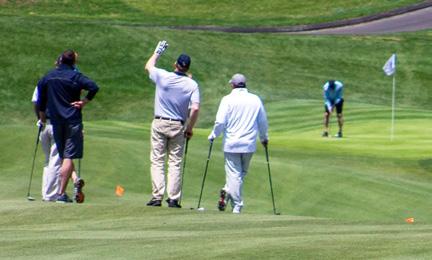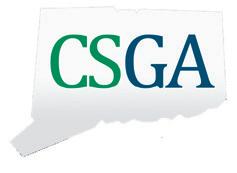
6 minute read
GOLF WELLNESS
WITH
Spine health and mindfulness is the ‘backbone’ to a long enjoyable golf career
hen playing any sport, it is important to protect your back, and that is especially true in golf.W
Whether you are swinging a club, picking up a ball or carrying your bag, you risk seriously injuring your back, says Dr. Jeffrey Bash, a board certified orthopedic surgeon with Middlesex Health who specializes in spine surgery. Tiger Woods is proof. The New York Times recently reported that the famous golfer has had five major back surgeries, including surgeries to repair herniated discs.
A herniated disc is a common, more serious golf injury — one that can greatly impair your mobility. When you have a herniated disc, the discs that sit between the bones that support the spine (vertebra) bulges out of place because of a tear in the disc’s exterior layer. “In other words, the jelly ruptures out of the donut,” Dr. Bash says. The result can be painful, especially if the disc is near a nerve. Symptoms can include pain, numbness and weaknesses that can travel through your legs. This condition is known as sciatica from a slipped disc.
But just because you could potentially hurt your back playing golf, doesn’t mean that you need to limit your time on the course. Dr. Bash says there are simple things you can do to lower your risk of injury and improve your overall health.

Walk rather than ride if you can
Walk the course. Don’t use a golf cart if you can help it. In addition to burning more calories, exercise can help improve your back health. It takes hours to play a round of golf, and Dr. Bash says prolonged sitting can increase pressure on those discs. Your back can tighten while sitting. When you suddenly take a swing, it can cause injury.
Consider how you carry your clubs
Instead of slinging a heavy golf bag over one shoulder, opt for a lighter walking bag with straps, and wear it like a knapsack. This may mean only carrying 10 extra golf balls instead of 30. You may also opt to leave your less used clubs in the car.
By wearing the bag like a knapsack, you evenly distribute the weight and use both shoulders.
For an even better option, buy a push cart or walking cart. In Europe and in Australasia, carts (or trolleys as they call them there) have been more prominent for decades than they are here at home. The globe sees golf as more exercise than sport for the casual amateur. We can learn from the trail they have blazed — by walking and using carts rather than a motorized cart.
Let a pro help select the right clubs — length and weight count
Get fitted by a professional. Your golf clubs should be the correct length. Otherwise, you risk injuring your back. The wrong set of clubs is no different that using a bowling ball that’s too heavy or wearing the wrong size shoes to compete or play in. Proper fitting and club choices are the new norm and can make all the difference.
Consider taking lessons from a pro. Learning to swing the right way will help to prevent injuries could make the difference between staying with the game or walking away from it due to frustrations surrounding swing mechanics and pain.
Use proper technique when bending to the ground
Whether you are picking up or placing your ball, or reading the green prior to a put, there’s a way to do it right. Avoid positions that result in bending your back, and especially bending with rotation. Bend with your knees and then kneel. This puts you closer to the ground so that you will not need to bend your back. If you already have back issues, you could also buy a gadget that picks up the ball for you.
Don’t forget to warm up
“It’s crucial in this sport that you take 10 minutes to stretch out,” Dr. Bash says. Stretch. Take some practice swings with different clubs. Warming up before hitting the course is a must, he says. Far too many golfers go right from the car to tee and never take even the minimum time to properly warm up. There are countless regimens, tools and ideas through Middlesex Health and from reputable sources on line guide you through warm ups that area good fit for you and your game.
Pro tip is to strengthen and stretch your abdominal and back muscles, known as your core. These muscles protect your spine.
Perfect your swing — shorter can be better
A shorter swing means less stress on your back. The more repetitive torque with force on your back, the greater the risk of a herniated disc. Consider players like Woods, Fred Couples and Jack Nicklaus when you think about the effects of rigorous swinging, repetition and how it affects spine health. All three players have taken acute focus on their back issues later in life to prolong their careers.
Manage your weight and quit smoking
While this is general health advice, Dr. Bash says it is important advice that can help your back. For example, smoking damages the discs in the spine — not just the heart and lungs.
When to get help
Even the best, most well conditioned golfers can hurt their backs. If you experience any neck or back pain that doesn’t go away, or if you experience any numbness in your arms or legs, you should see a spine surgeon. You may need to get an MRI of your spine.
Fortunately, back injuries can often be treated by taking anti-inflammatory medicine, getting steroid injections, or visiting a physical therapist or chiropractor. If needed, surgery may be another option, and Middlesex Health performs minimally invasive procedures, disc replacement and robotic surgery that can improve results with less recovery time. Orthopedic surgeons use the latest technology to ensure the best possible outcomes, and surgeries are performed in stateof-the-art operating rooms at Middlesex Hospital that are specifically designed to accommodate orthopedic surgeries. A personalized, multimodal pain management strategy is used, and pain certified specialists are available.
The hospital’s Center for Joint Replacement and Spine Surgery provides high quality, compassionate, personalized care in a homelike environment and is recognized as an orthopedic center of excellence. Middlesex has earned five consecutive Magnet designations from the American Nurses Credentialing Center, which also highlights the hospital’s commitment to excellence. Middlesex Health Physical Rehabilitation, which has eight locations throughout Middlesex County and the Connecticut shoreline, can help you to reduce pain and restore function, which is important when you are dealing with any injury.
It is worth noting that several Middlesex Health physical therapists are certified in the McKenzie Method of Mechanical Diagnosis and Therapy, which is a systematic approach to assessment and treatment of spine and extremity disorders.

Help is a CLICK away right here
For more information about Spine Surgery at Middlesex Health, click here.
For more information about Physical Rehabilitation services at Middlesex Health, click here.

Official Health Care Provider for:












